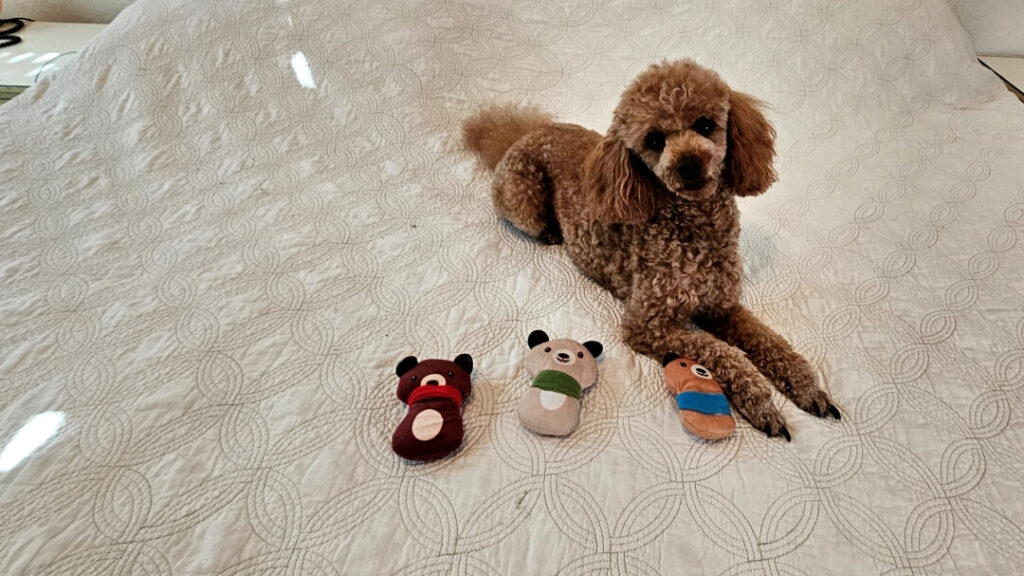What Every Poodle Owner Needs to Know About Cushing’s Disease
If you’re a proud owner of a Miniature Poodle, you know how special these little dogs are. They’re known for their intelligence, playful nature, and loving demeanor.
However, like all breeds, Miniature Poodles can face specific health challenges, one of which is Cushing’s Disease. Understanding this condition is crucial for ensuring your furry friend lives a happy, healthy life.
In this blog post, we’ll take a deep dive into Cushing’s Disease, exploring its symptoms, diagnosis, and treatment options. You’ll also find practical tips for managing your Poodle’s daily life and hear inspiring stories from other owners.
Let’s get started on this important journey to better care for your Miniature Poodle.
What Is Cushing’s Disease?
Cushing’s Disease, also known as hyperadrenocorticism, is a condition where the adrenal glands produce excessive cortisol. This hormone is vital for various bodily functions but too much of it can lead to severe health issues. Cushing’s Disease is relatively common in dogs, particularly in older ones.
For Miniature Poodles, this condition can be especially concerning due to their size and predisposition.

Why It Matters for Miniature Poodles
Miniature Poodles are prone to certain genetic conditions, and Cushing’s Disease is one of them. The disease can severely impact their quality of life, causing symptoms that range from mild to debilitating.
Recognizing and treating this condition early can make a significant difference in your Poodle’s well-being.
Prevalence and Impact
Studies show that small breeds like Miniature Poodles are at a higher risk for developing Cushing’s Disease. This makes awareness and early detection crucial for owners.
Understanding the prevalence and impact can help you stay vigilant and proactive in your dog’s health care.

Recognizing the Signs and Symptoms
Knowing what to look for can be a lifesaver. Cushing’s Disease manifests through various signs and symptoms that can be easily overlooked if you’re not aware of them. Here are the most common indicators.
Increased Thirst and Urination
One of the first signs you may notice is your Poodle drinking more water than usual and needing to urinate frequently. This symptom alone isn’t definitive but is a strong indicator when combined with other signs.
Weight Gain and Pot-Bellied Appearance
Another common symptom is unexplained weight gain, especially around the abdomen. Your Miniature Poodle may develop a pot-bellied appearance even if their diet hasn’t changed.
Skin and Coat Changes
Look out for changes in your Poodle’s skin and coat. Hair loss, thinning fur, and skin infections are common symptoms. These changes occur because the excess cortisol weakens the skin and hair follicles.

How Is Cushing’s Disease Diagnosed?
Diagnosing Cushing’s Disease involves several steps and tests. Early detection is key to managing the condition effectively.
Veterinary Examination
The first step is a thorough examination by your veterinarian. They’ll look for physical signs and ask about any changes in your dog’s behavior or health.
Blood Tests
Blood tests, such as the ACTH stimulation test and the low-dose dexamethasone suppression test, are commonly used to diagnose Cushing’s Disease. These tests measure cortisol levels and how the body responds to stimuli that should normally suppress cortisol production.
Imaging
In some cases, imaging tests like ultrasound or MRI may be needed to assess the adrenal glands and identify any tumors or abnormalities.
Treatment Options for Cushing’s Disease
Once diagnosed, treating Cushing’s Disease is a multi-faceted approach. There are several options available, each with its pros and cons.
Medication
Medications like trilostane and mitotane are commonly prescribed to control cortisol production. These drugs can be highly effective but require regular monitoring and dose adjustments.
Surgery
Surgical options, such as removing an adrenal gland tumor, can be considered in severe cases. Surgery is usually a last resort and is recommended when other treatments are ineffective.
Holistic Approaches
Some owners opt for holistic treatments, which may include dietary changes, herbal supplements, and acupuncture. While not a replacement for conventional treatments, these approaches can complement medical therapy and improve overall well-being.

Managing Day-to-Day Life with Cushing’s Disease
Living with a Miniature Poodle who has Cushing’s Disease requires some adjustments. Here are practical tips to help manage their daily life.
Diet and Nutrition
Focus on a balanced diet rich in nutrients. Avoid high-fat foods and consider specialized diets designed for dogs with Cushing’s Disease. Consult your vet for personalized recommendations.
Exercise and Activity
Regular, moderate exercise is essential. Short walks and gentle play sessions can help maintain your Poodle’s weight and muscle tone without overexerting them.
Stress Reduction
Minimize stressors in your dog’s environment. A calm, predictable routine can significantly improve their quality of life. Consider using calming sprays or supplements if your dog is particularly anxious.
Inspiring Success Stories
Hearing from other Poodle owners who have successfully managed Cushing’s Disease can be incredibly encouraging. Here are a couple of stories that highlight the resilience and joy these dogs can continue to bring into your life.
Bella’s Journey
Bella was diagnosed with Cushing’s Disease at age nine. Her owner, Sarah, was devastated but committed to giving Bella the best care possible. Through a combination of medication, a specialized diet, and regular vet check-ups, Bella’s symptoms were well-managed. Today, Bella is thirteen and still enjoys her daily walks and playtime.
Max’s Triumph
Max’s story is one of perseverance. Diagnosed with Cushing’s Disease at seven, his symptoms were severe. After trying various treatments, his owner opted for surgery to remove an adrenal tumor. The surgery was a success, and Max is now thriving. His story shows that even in severe cases, there is hope.

Final Thoughts
Cushing’s Disease is a challenging but manageable condition. With the right knowledge and proactive care, you can ensure your Miniature Poodle lives a happy, healthy life. Remember, early detection and consistent management are key to success.
For more personalized advice and support, consider booking a consultation with a veterinary professional who specializes in endocrine disorders. Your dedication to your Poodle’s health will make all the difference.
Thank you for taking the time to learn about Cushing’s Disease and how to care for your Miniature Poodle. Together, we can make their lives better, one day at a time.

